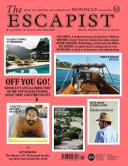
The Escapist
Off you go! Monocle’s annual directory of the top places to dine, sleep, shop and stretch out.
In This Issue
Oops! No content was found.
Looks like we no longer have content for the page you're on. Perhaps try a search?
Return Home
Daily inbox intelligence from Monocle

Off you go! Monocle’s annual directory of the top places to dine, sleep, shop and stretch out.
Looks like we no longer have content for the page you're on. Perhaps try a search?
Return Home